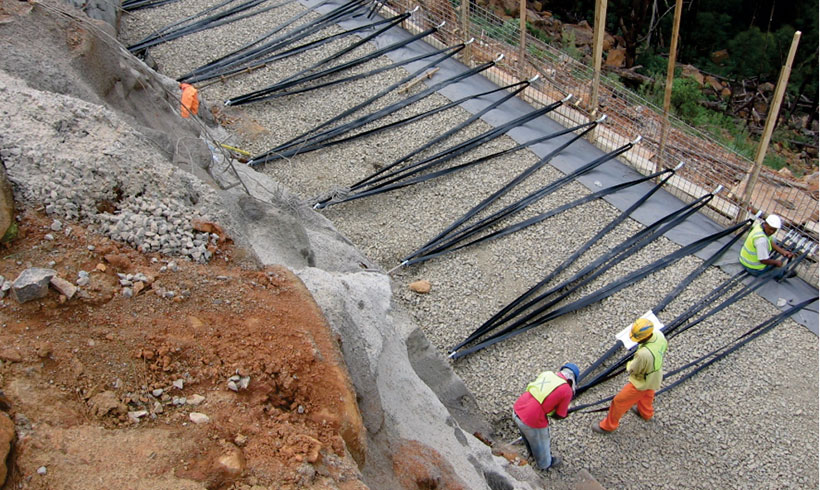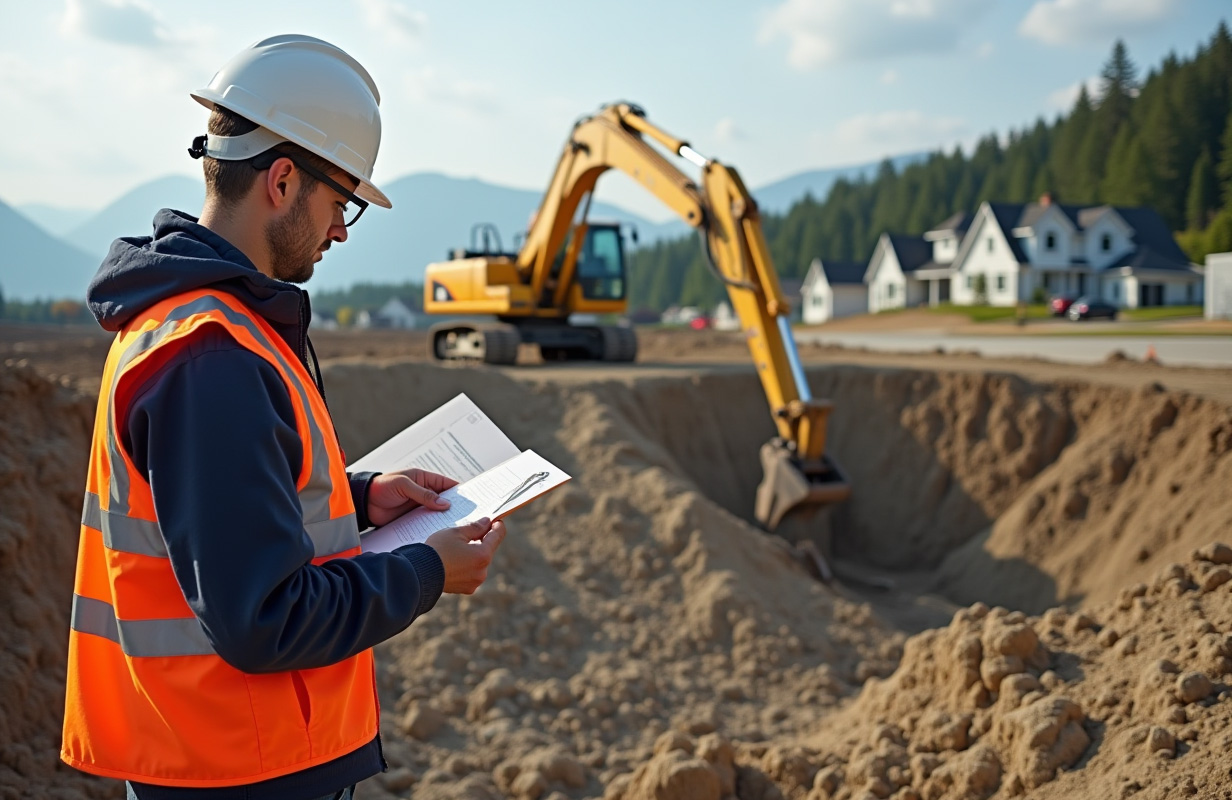Leading Reasons to Hire a Geotechnical Specialist for Your Construction Jobs
Leading Reasons to Hire a Geotechnical Specialist for Your Construction Jobs
Blog Article
The Value of Geotechnical Design in Attending To Environmental Difficulties and Enhancing Building And Construction Safety And Security
Geotechnical engineering offers as a foundation in the junction of environmental stewardship and construction security, providing essential understandings right into the behavior of soil and rock under various problems. By executing calculated site investigations and customized mitigation steps, geotechnical engineers play an essential function in securing both human lives and eco-friendly integrity.

Role of Geotechnical Engineering
Geotechnical engineering plays a crucial role in the style and building of facilities by dealing with the behavior of soil and rock products under various problems. This area of engineering is vital for comprehending the interaction in between frameworks and the ground, that includes establishing the load-bearing ability of soil, evaluating security, and forecasting possible settlement or failing.
Geotechnical designers are in charge of carrying out site examinations, which entail sampling and testing dirt and rock to gather data on their chemical and physical residential properties. This information is important for making foundations, preserving wall surfaces, and other earth-retaining frameworks that ensure safety and security and long life. Additionally, geotechnical engineering educates the selection of proper construction approaches and materials, thereby lessening threats connected with soil habits.
Furthermore, the assimilation of geotechnical engineering concepts right into metropolitan preparation and environmental management is critical for dealing with obstacles such as ground contamination and groundwater management. By comprehending geotechnical variables, engineers can establish lasting services that boost the resilience of facilities versus natural threats, while also promoting ecological stewardship. Inevitably, the role of geotechnical engineering is vital for achieving safe, long lasting, and eco aware construction practices.
Dirt Erosion Mitigation
Soil erosion positions a substantial hazard to both environmental security and framework honesty, influencing approximately 24 billion lots of productive dirt shed annually worldwide. This phenomenon is intensified by elements such as deforestation, urbanization, and bad agricultural methods. Geotechnical design plays an essential function in establishing efficient soil erosion reduction approaches that guard both the setting and building and construction tasks.
One technique involves the application of disintegration control methods such as vegetation growing, which maintains dirt with root systems. Additionally, the construction of preserving terraces and walls can effectively lower surface overflow and protect susceptible areas from disintegration. Correct water drainage style is also essential; it decreases water build-up and directs excess runoff far from important frameworks.
Furthermore, geotechnical designers employ soil stabilization methods, such as the application of geotextiles and eco-friendly floor coverings, to enhance dirt communication and protect against destruction - all about geotechnical engineering. Routine monitoring and analysis of erosion-prone sites allow timely treatments, guaranteeing long-term sustainability. By incorporating these techniques, geotechnical design not only minimizes the impacts of dirt erosion yet also adds to the resilience of framework against ecological challenges, eventually fostering a much safer and extra sustainable constructed environment
Groundwater Security Strategies
Groundwater works as an important source for drinking water, agriculture, and commercial processes, making its defense important for ecological sustainability and public health. Efficient groundwater security approaches are important in mitigating contamination dangers and making certain the longevity of this resource.

Regular surveillance of groundwater high quality is likewise important, making it possible for very early detection of contamination resources and facilitating prompt removal efforts. Using sophisticated modern technologies, such as geophysical surveys and remote picking up, aids in recognizing possible risks to groundwater gets.
Additionally, public education and learning and stakeholder engagement are critical, fostering area assistance for groundwater security campaigns. geotechnical engineer description. By incorporating regulatory procedures, technical developments, and community participation, we can develop an extensive structure that safeguards groundwater sources while promoting sustainable advancement and construction methods
Landslide Threat Management
Landslides position considerable hazards to both human safety and facilities, making reliable threat management strategies essential. Geotechnical engineering plays a vital duty in determining, examining, and mitigating landslide risks. A comprehensive understanding of incline security, dirt technicians, and hydrology is vital for developing reliable threat management strategies.
The primary step in landslide risk monitoring entails detailed site examinations, that include geological mapping and dirt screening. These examinations help designers review the capacity for landslides by determining essential elements such as slope angles, dirt structure, and water material. Using innovative innovations such as remote noticing and geophysical surveys can enhance the accuracy of these assessments.
Once risks are recognized, ideal reduction steps can be carried out. These might include engineering options such as maintaining walls, water drainage systems, and incline stablizing methods. Keeping an eye on systems need to be developed to discover signs of ground movement and adjustments in water degrees, allowing for aggressive interventions.

Enhancing Building Security
Building sites typically provide a myriad of risks that can endanger worker security and job integrity. Geotechnical engineering plays a crucial role in enhancing building and construction safety by offering vital insights into subsurface problems. With detailed soil and rock analysis, geotechnical engineers can identify possible threats, such as soil instability, groundwater issues, and seismic vulnerabilities, which might jeopardize the safety of building and construction activities.
Applying geotechnical solutions, such as appropriate structure design and making use of retaining frameworks, minimizes these dangers substantially. These solutions not only guarantee the stability of the frameworks being developed but additionally produce a much safer working environment for building and construction workers. Additionally, strenuous tracking read review and analysis of site problems throughout the building and construction procedure are important. Utilizing sophisticated technologies like ground-penetrating radar and inclinometer systems makes it possible for real-time data collection, permitting for timely interventions when threats are found.
Furthermore, cultivating a society of safety through training and adherence to established security protocols further enhances building website safety and security. By integrating geotechnical knowledge into the planning and execution phases, construction projects can achieve greater security requirements, eventually securing employees and making sure effective job completion.
Final Thought
To conclude, geotechnical design acts as a vital self-control in dealing with environmental challenges and advertising building and construction security. With effective dirt disintegration mitigation, groundwater protection methods, and landslide danger management, geotechnical engineers add to the advancement of resilient infrastructure. The assimilation of these methods fosters a safer construction setting and improves the sustainability of civil engineering tasks. Eventually, the proficiency of geotechnical designers is vital in protecting both natural deposits and human lives against potential dangers.
Geotechnical engineering offers as a cornerstone in the crossway of ecological stewardship and construction safety and security, providing essential understandings into click resources the habits of dirt and rock under various problems. Geotechnical design informs the choice of ideal construction approaches and materials, therefore lessening dangers associated with dirt actions.
Geotechnical design plays a critical role in establishing efficient dirt disintegration mitigation techniques that guard both the environment and construction jobs.
Additionally, geotechnical designers use soil stabilization techniques, such as the application of geotextiles and naturally degradable mats, to boost soil cohesion and avoid deterioration. With detailed dirt and rock analysis, geotechnical designers can recognize potential risks, such as soil instability, groundwater issues, and seismic vulnerabilities, which may compromise the safety of construction tasks.
Report this page